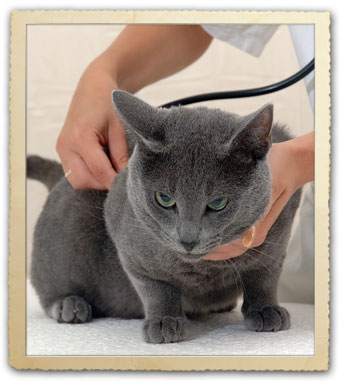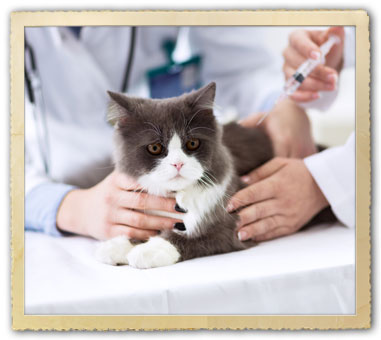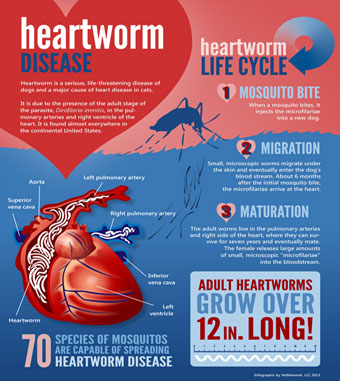Wellness Services for Your Deer Park Pet
Wellness Care for Every Age and Stage

The veterinary team at Park Hills Animal Hospital and Wellness Center believes that prevention contributes to your pet's long term health and minimizes the lifetime cost of care. We strongly recommend routine wellness exams, vaccinations, regular lab work, deworming and fecal checks, as well as medications to prevent heartworm, fleas and ticks to keep your pet in optimum health.
Wellness exams are especially important for very young pets and senior pets, which are animals over seven years of age. They provide us with a general picture of your pet's overall health and are invaluable in identifying and addressing concerns before they become serious problems.
Please take a look at the services we offer to learn why we believe they are important to the care and well-being of your pet. Then give us a call to set up an appointment today!
Your Pet's Wellness Examination at Park Hills Animal Hospital
Wellness examinations are the same for your pet as the yearly physical you receive from your doctor. It's a chance for us to assess your pet's overall health, discuss any changes we see, educate and update you on advancements in veterinary care, and is also an opportunity for you to discuss any of your concerns or ask questions.
Your pet's yearly wellness examination at Park Hills Animal Hospital and Wellness Center includes our commitment to:

|
|
Deworming and Fecal Check
Dangerous parasites are always present in the environment. We recommend regular fecal checks and deworming as the best way to prevent parasitic disease and the transmission of intestinal parasites to your pet and your family members.
Regular Blood Testing
A complete physical should include a blood test. Not only can a chemistry panel and blood count identify the presence of underlying disease processes, but these tests help create a baseline should your pet become ill between regular examinations.
You Know Your Pet Best
No one knows and understands your pet like you do. At home, watch for subtle changes in your pet's body weight, appetite, water intake, urination, and bowel habits, as well as general attitude and activity level. These changes may be signs of medical problems. Lumps and bumps under the skin may seem harmless, but can be cancerous. Ear infections, abscessed teeth, and gum disease are common, painful conditions that may not become obvious until seriously advanced. A comprehensive physical exam is the tool to evaluate your dog's, cat's, or other pet's health status and to help you make informed decisions about the care of your special companion. If you notice anything unusual about your pet's behavior or physical condition, please give us a call.
Our Wellness Programs

Your dog or cat has different health care requirements at each stage of his or her life. Park Hills Animal Hospital and Wellness Center has developed a series of preventive wellness programs for puppies and kittens, adult pets, and senior pets.
Puppies and Kittens:
Like infants, puppies and kittens require a series of monthly health exams and lab work during their first 6 months of life. Our comprehensive pediatric visits include a physical exam to ensure proper development, parasitic disease screening and treatment, and vaccinations. We will begin year-round preventative medication for fleas, ticks, and heartworm parasites. At 6 months of age, we recommend spaying or neutering and microchipping your pet.
Adult Pets (Ages 1-6):
For adult dogs and cats, we recommend a yearly wellness visit consisting of a comprehensive physical exam, dental health evaluation, vaccinations, intestinal parasite evaluation, and screening for exposure to common tick diseases, heartworm disease, intestinal parasites, and others.
Senior Care (Pets Age 7 and Older):
Older pets can suffer from a variety of illnesses, such as kidney disease, diabetes, cancer, and arthritis. The key to managing these conditions is early detection and treatment. Because animals have a unique ability to hide disease and pain, we recommend that you bring your senior pet for a physical exam at least twice a year. We also perform blood and urine tests to detect diseases in their earliest stages, allowing your pet to enjoy the longest and healthiest life possible.
Vaccinations
 */?>
*/?>
Due to the many recent discoveries and innovations in veterinary medicine, your pet can be protected against most major infectious diseases. Today, many immunizations and preventive treatments are available that did not exist a decade ago.
Vaccines are useful in preventing canine distemper, parvovirus, bordetella, rabies, Lyme disease, and other diseases in your dog and feline leukemia, panleukopenia, rabies, and feline immunodeficiency virus in cats. Our staff at Park Hills Animal Hospital and Wellness Center can assist you in deciding which preventive measures are necessary for your pet.
Your pet is unique and he or she has individual needs when it comes to vaccinations. We vaccinate based on your pet's lifestyle and other risk factors; however, we do adhere to the following general vaccination protocols:
Dogs:
|
Cats:
|
Flea and Tick Prevention on Long Island
Fleas and ticks are virtually everywhere. Although they're a bigger problem in certain parts of the country and at specific times during the year, no cat or dog is completely safe from them. Fortunately, many safe and highly effective products are available. Fleas and ticks are more than a nuisance; they carry diseases dangerous to both you and your pet. Fleas can transmit tapeworms, and often you can see segments of the tapeworm in your pet's stool. Ticks are the main carriers of Lyme disease.
Fleas are most abundant during the warm weather; however, if left untreated, they can be a nuisance year-round. Ticks tend to thrive in wooded areas or in high grass. It is often difficult to keep your pets away from tick infested areas, so if they do go exploring, check them when they come inside.
In 1979, Dr. Barry Lissman discovered Rocky Mountain spotted fever in dogs, and was the first individual to publish its clinical findings. In 1983, Dr. Lissman discovered Lyme disease in animals, and is credited with discovering Lyme disease in animals and is recognized nationally and internationally as an authority on the disease.
Flea and tick problems can be avoided by using parasite prevention products that are available at our hospital. When used properly and according to our directions, these products are very safe and effective.
Heartworm Disease

Heartworm disease is a serious, life-threatening disease affecting dogs and, to a lesser extent, cats. Mosquitoes spread the disease by injecting the parasite into your pet at the time of the bite. Clinical symptoms of heartworm disease develop very slowly and include lack of energy, exercise intolerance, coughing, and difficulty breathing. Because heartworm disease is increasing in frequency and is a serious and deadly disease, we recommend that your dog be tested annually.
Heartworm disease prevention is simple and effective. For dogs, a once-a-month heartworm preventive can be given as a tasty, chewable treat. This same chewable medicine prevents not only heartworms from developing, but also kills and prevents most other types of worms that can infect your dog. Cats are protected by applying a drop of heartworm prevention liquid to the skin once-a-month. We recommend this to prevent heartworm disease as well as fleas, ear mites, and other types of worms that can infect your cat.
If you would like to have your pet tested for heartworm disease, or if you would like additional information on how best to protect your pet from this dangerous parasite, please call Park Hills Animal Hospital and Wellness Center today at
(631) 667-2220 for an appointment.
Internal Medicine
Sometimes one of the frustrations of dealing with a sick pet is that you cannot simply ask him/her what is wrong. Therefore, Park Hills Animal Hospital and Wellness Center has invested in the latest advanced diagnostic technology. When your pet is not well, we need to find out what is wrong. After performing a thorough examination, a series of diagnostic tests is often necessary in order to identify the medical condition.
All the veterinarians at Park Hills Animal Hospital and Wellness Center are knowledgeable and have a large amount of expertise in diagnosing and treating complex internal medicine cases such as kidney, heart, respiratory, immune-mediated, and endocrine diseases.
